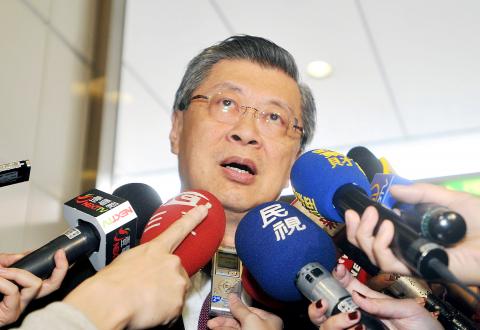President Ma Ying-jeou (馬英九) has decided to appoint Vice Premier Sean Chen as the nation’s new premier, a senior Chinese Nationalist Party (KMT) official said yesterday.
Chen will be officially named as the new premier on Tuesday, the same day Premier Wu Den-yih (吳敦義) formally resigns, the official said.
Chen declined to comment, saying that he would only issue a statement once an official appointment has been made.

Photo: CNA
The 62-year-old, who graduated from National Taiwan University’s College of Law, helped to guide Taiwan through the financial crisis of 2008 as then-Financial Supervisory Commission chairman.
Chen was also behind the signing of a memorandum of understanding (MOU) on financial supervisory cooperation with China in 2009, which widened access to banks on each side of the Taiwan Strait, promoting joint financial supervision, enhanced information sharing and risk management.
He also kept a firm hand on Taiwan’s stock market, minimizing investors’ losses from the eurozone debt crisis.
Chen’s appointment could make the new Cabinet more likely to focus on economic growth, analysts said.
Questioned by reporters, Chen said Ma invited him to his official residence on Thursday for discussions, but he would not confirm the comments of the unnamed senior KMT official regarding his appointment as premier.
Meanwhile, the Chinese-language China Times reported that Minister of the Interior Jiang Yi-huah (江宜樺), who has been touted as a candidate for vice premier, is not interested in the post.
Deputy Legislative Speaker Tseng Yung-chuan (曾永權) is expected to become the new Presidential Office secretary-general and former KMT whip Lin Yi-shih (林益世) is to become Executive Yuan secretary-general, local media reported yesterday.
Reacting to news of Chen’s possible appointment, Democratic Progressive Party caucus whip Tsai Huang-liang (蔡煌瑯) told reporters that he would welcome the appointment and that he hoped Chen would shake up the Cabinet with new faces.
Tsai said he hoped Chen would appoint individuals with strong financial backgrounds to the new Cabinet to help Taiwan navigate the eurozone debt crisis, which is threatening to destabilize the global economy.
Although a major Cabinet reshuffle appears unlikely, government departments that deal with financial affairs are expected to see new appointments as the new premier undertakes reforms, local media reported yesterday.

Intelligence agents have recorded 510,000 instances of “controversial information” being spread online by the Chinese Communist Party (CCP) so far this year, the National Security Bureau (NSB) said in a report yesterday, as it warned of artificial intelligence (AI) being employed to generate destabilizing misinformation. The bureau submitted a written report to the Legislative Yuan in preparation for National Security Bureau Director-General Tsai Ming-yen’s (蔡明彥) appearance before the Foreign Affairs and National Defense Committee today. The CCP has been using cognitive warfare to divide Taiwanese society by commenting on controversial issues such as Taiwan Semiconductor Manufacturing Co’s (TSMC, 台積電) investments in the

HELPING HAND: The steering committee of the National Stabilization Fund is expected to hold a meeting to discuss how and when to utilize the fund to help buffer the sell-off The TAIEX plunged 2,065.87 points, or 9.7 percent, to close at 19,232.35 yesterday, the highest single-day percentage loss on record, as investors braced for US President Donald Trump’s tariffs after an extended holiday weekend. Amid the pessimistic atmosphere, 945 listed companies led by large-cap stocks — including Taiwan Semiconductor Manufacturing Co (TSMC, 台積電), Hon Hai Precision Industry Co (鴻海精密) and Largan Precision Co (大立光) — fell by the daily maximum of 10 percent at the close, Taiwan Stock Exchange data showed. The number of listed companies ending limit-down set a new record, the exchange said. The TAIEX plunged by daily maxiumu in just

‘COMPREHENSIVE PLAN’: Lin Chia-lung said that the government was ready to talk about a variety of issues, including investment in and purchases from the US The National Stabilization Fund (NSF) yesterday announced that it would step in to staunch stock market losses for the ninth time in the nation’s history. An NSF board meeting, originally scheduled for Monday next week, was moved to yesterday after stocks plummeted in the wake of US President Donald Trump’s announcement of 32 percent tariffs on Taiwan on Wednesday last week. Board members voted to support the stock market with the NT$500 billion (US$15.15 billion) fund, with injections of funds to begin as soon as today. The NSF in 2000 injected NT$120 billion to stabilize stocks, the most ever. The lowest amount it

NEGOTIATIONS: Taiwan has good relations with Washington and the outlook for the negotiations looks promising, Minister of Economic Affairs J.W. Kuo said Taiwan’s GDP growth this year is expected to decrease by 0.43 to 1.61 percentage points due to the effects of US tariffs, National Development Council (NDC) Minister Paul Liu (劉鏡清) said at a meeting of the legislature’s Economics Committee in Taipei yesterday, citing a preliminary estimate by a private research institution. Taiwan’s economy would be significantly affected by the 32 percent “reciprocal” tariffs slapped by the US, which took effect yesterday, Liu said, adding that GDP growth could fall below 3 percent and potentially even dip below 2 percent to 1.53 percent this year. The council has commissioned another institution